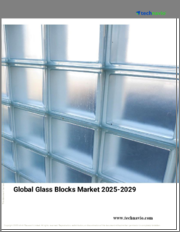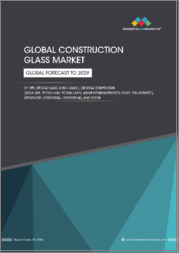
|
시장보고서
상품코드
1900433
건설용 유리 시장 규모, 점유율, 성장 분석 : 유형별, 제조 공정 분석, 제품별, 화학 조성별, 용도별, 지역별 - 업계 예측(2026-2033년)Construction Glass Market Size, Share, and Growth Analysis, By Type (Low E Glass, Special Glass), By Manufacturing Process, By Product, By Chemical Composition, By Application, By Region - Industry Forecast 2026-2033 |
||||||
건설용 유리 시장 규모는 2024년에 1,508억 6,000만 달러로 평가되었으며, 2025년 1,623억 2,000만 달러에서 2033년까지 2,916억 6,000만 달러로 성장할 전망입니다. 예측 기간(2026-2033년) 동안 CAGR은 7.6%로 예측됩니다.
세계 건설용 유리 시장은 도시화의 진전과 지속가능한 건축 솔루션에 대한 수요 증가로 인해 괄목할 만한 성장세를 보이고 있습니다. 주요 촉진요인으로는 인구 증가와 주거단지, 상업시설, 쇼룸 등의 급속한 개발 프로젝트를 들 수 있으며, 이는 다양한 산업 분야의 특정 용도에 맞게 설계된 플로트 유리, 코팅 유리, 접합 유리와 같은 고급 유리 제품에 대한 수요를 촉진하고 있습니다. 주택 건설은 특수 유리 솔루션에 대한 수요 증가에 힘입어 주요 부문으로 자리 매김하고 있습니다. 북미, 유럽, 아시아태평양은 각기 다른 규제 프레임워크와 건설 관행의 영향을 받으면서도 이 시장을 주도하는 중요한 지역입니다. 경쟁은 치열하고, 주요 업체들은 전략적 제휴와 기술 혁신을 추구하고 있지만, 시장은 원자재 가격 변동과 규제 제약과 같은 도전에 직면해 있습니다.
건설용 유리 시장 촉진요인
건설용 유리 시장을 이끄는 주요 요인은 유리 제조 및 가공 기술의 지속적인 발전입니다. 스마트 유리 시스템, 다이나믹 글레이징, 에너지 절약 코팅 등의 혁신 기술은 다양한 용도의 폭넓은 활용을 촉진하고 있습니다. 예를 들어, 스마트 유리는 빛과 열의 투과를 동적으로 관리하여 에너지 효율을 높이고 거주자의 편안함을 향상시킵니다. 이러한 기술적 혁신은 지속가능하고 고성능 건축자재에 대한 수요 증가에 부응할 뿐만 아니라 스마트 인프라 및 현대 건축 디자인 분야에서 새로운 기회를 창출하며 업계의 중요한 진화를 반영하고 있습니다.
건설용 유리 시장 억제요인
세계 건설용 유리 시장에 영향을 미치는 주요 제약 중 하나는 유리 생산에 필수적인 원료, 특히 소다회, 실리카, 석회석의 비용 변동입니다. 이러한 변동은 유리 제조업체의 총 생산 비용에 직접적인 영향을 미치며, 건설용 유리 제품의 일관된 가격 유지에 어려움을 초래합니다. 이러한 주요 재료의 가격 변동은 제조업체에 추가적인 압력을 가하고 효율적인 운영과 경쟁력 있는 가격 책정을 유지하는 데 방해가 될 수 있습니다. 이러한 불확실성은 소비자와 건설업체가 비용 변동에 대응하여 대안을 찾거나 프로젝트를 연기할 수 있기 때문에 궁극적으로 시장 역학에 영향을 미칠 수 있습니다.
건설용 유리 시장 동향
건설용 유리 시장에서는 스마트 유리 기술의 통합을 향한 큰 전환이 일어나고 있으며, 이는 건축자재의 혁신과 지속가능성이라는 광범위한 트렌드를 반영하고 있습니다. 소비자들이 에너지 효율과 고도의 기능성을 점점 더 중요시하는 가운데, 주요 시장 기업들은 제품 포트폴리오를 다양화하여 외부 자극에 따라 광 투과 특성을 변화시키는 스위칭 유리를 도입하고 있습니다. 이러한 진화는 미적 매력을 향상시킬 뿐만 아니라 현대 건축 요구 사항에 따라 에너지 절약에도 기여합니다. 현대 인프라에서 스마트 글래스 채택이 증가하고 있는 것은 환경 친화적 노력에 대한 의지를 보여주는 동시에 변화하는 소비자 선호도와 규제 압력에 대한 업계의 대응을 상징합니다.
자주 묻는 질문
목차
소개
- 조사 목적
- 조사 범위
- 정의
조사 방법
- 정보 조달
- 2차와 1차 데이터 방법
- 시장 규모 예측
- 시장 가정과 제한
주요 요약
- 세계 시장 전망
- 공급과 수요 동향 분석
- 부문별 기회 분석
시장 역학과 전망
- 시장 규모
- 시장 역학
- 성장 촉진요인과 기회
- 성장 억제요인과 과제
- Porters 분석
주요 시장 인사이트
- 핵심성공요인
- 경쟁 정도
- 주요 투자 기회
- 시장 생태계
- 시장 매력 지수(2025년)
- PESTEL 분석
- 거시경제 지표
- 밸류체인 분석
- 가격 분석
세계의 건설용 유리 시장 규모 : 유형별 & CAGR(2026-2033년)
- 저방사율 유리
- 특수 유리
세계의 건설용 유리 시장 규모 : 제조 공정별 & CAGR(2026-2033년)
- 플로트 유리 제법
- 압연/시트 프로세스
세계의 건설용 유리 시장 규모 : 제품별 & CAGR(2026-2033년)
- 플로트 유리
- 코팅 유리
세계의 건설용 유리 시장 규모 : 화학 조성별 & CAGR(2026-2033년)
- 소다 석회
- 칼리 석회
- 칼륨 납
세계의 건설용 유리 시장 규모 : 용도별 & CAGR(2026-2033년)
- 주택 건설
- 상업 건설
- 기타
세계의 건설용 유리 시장 규모 & CAGR(2026-2033년)
- 북미
- 미국
- 캐나다
- 유럽
- 독일
- 스페인
- 프랑스
- 영국
- 이탈리아
- 기타 유럽
- 아시아태평양
- 중국
- 인도
- 일본
- 한국
- 기타 아시아태평양
- 라틴아메리카
- 브라질
- 기타 라틴아메리카
- 중동 및 아프리카
- GCC 국가
- 남아프리카공화국
- 기타 중동 및 아프리카
경쟁 정보
- 상위 5개사의 비교
- 주요 기업의 시장 포지셔닝(2025년)
- 주요 시장 기업이 채용한 전략
- 최근의 시장 동향
- 기업의 시장 점유율 분석(2025년)
- 주요 기업 개요
- 기업 상세
- 제품 포트폴리오 분석
- 기업 부문별 점유율 분석
- 매출 전년비 비교(2023-2025년)
주요 기업 개요
- AGC Inc.(Japan)
- NSG Group(Japan)
- Saint-Gobain(France)
- Guardian Industries(United States)
- Sisecam(Turkey)
- Central Glass Co., Ltd.(Japan)
- Vitro(Mexico)
- China Glass Holdings Limited(China)
- Corning Incorporated(United States)
- Xinyi Glass Holdings Limited(China)
- PPG Industries(United States)
- SCHOTT AG(Germany)
- Nippon Sheet Glass Co., Ltd.(Japan)
- Asahi India Glass Ltd.(India)
- Guardian Glass(United States)
- Saint-Gobain Sekurit(France)
- Pilkington(United Kingdom)
- Plate Glass(United States)
- Bendheim(United States)
결론과 제안
KSM 26.01.20Construction Glass Market size was valued at USD 150.86 Billion in 2024 and is poised to grow from USD 162.32 Billion in 2025 to USD 291.66 Billion by 2033, growing at a CAGR of 7.6% during the forecast period (2026-2033).
The global construction glass market is on a trajectory of significant growth, fueled by strong urbanization trends and increasing demand for sustainable building solutions. Key drivers include rising populations and rapid development projects such as residential complexes, commercial malls, and showrooms, which foster the need for advanced glass products like float, coated, and laminated glass tailored for specific applications across diverse industries. Residential construction remains the leading segment, spurred by a growing need for specialized glass solutions. North America, Europe, and Asia Pacific are pivotal regions propelling this market, each influenced by distinct regulatory frameworks and construction habits. The competitive landscape is vibrant, with major players pursuing strategic collaborations and innovations, while the market also faces challenges like raw material cost fluctuations and regulatory constraints.
Top-down and bottom-up approaches were used to estimate and validate the size of the Construction Glass market and to estimate the size of various other dependent submarkets. The research methodology used to estimate the market size includes the following details: The key players in the market were identified through secondary research, and their market shares in the respective regions were determined through primary and secondary research. This entire procedure includes the study of the annual and financial reports of the top market players and extensive interviews for key insights from industry leaders such as CEOs, VPs, directors, and marketing executives. All percentage shares split, and breakdowns were determined using secondary sources and verified through Primary sources. All possible parameters that affect the markets covered in this research study have been accounted for, viewed in extensive detail, verified through primary research, and analyzed to get the final quantitative and qualitative data.
Construction Glass Market Segments Analysis
Global Construction Glass Market is segmented by Type, Manufacturing Process, Product, Chemical Composition, Application and region. Based on Type, the market is segmented into Low E Glass and Special Glass. Based on Manufacturing Process, the market is segmented into Float Glass Process and Rolled/Sheet Process. Based on Product, the market is segmented into Float Glass and Coated Glass. Based on Chemical Composition, the market is segmented into Soda Lime, Potash Lime and Potash Lead. Based on Application, the market is segmented into Residential Construction, Commercial Construction and Other. Based on region, the market is segmented into North America, Europe, Asia Pacific, Latin America and Middle East & Africa.
Driver of the Construction Glass Market
A major force driving the construction glass market is the ongoing advancements in glass manufacturing and processing technologies. Innovations like smart glass systems, dynamic glazing, and energy-efficient coatings are fostering broader use across multiple applications. For example, smart glass facilitates dynamic management of light and heat transmission, improving energy efficiency and enhancing occupant comfort. These technological breakthroughs not only cater to the increasing demand for sustainable and high-performance building materials but also create new opportunities within the realm of smart infrastructure and modern architectural designs, reflecting a significant evolution in the industry.
Restraints in the Construction Glass Market
One significant constraint impacting the global construction glass market is the volatility in the costs of raw materials essential for glass production, particularly soda ash, silica, and limestone. These fluctuations can have a direct effect on overall production expenses for glass manufacturers, creating challenges in maintaining consistent pricing for construction glass products. As the prices of these key materials fluctuate, it places additional pressure on manufacturers, potentially hindering their ability to operate efficiently and sustain competitive pricing. This uncertainty can ultimately affect market dynamics, as consumers and builders may seek alternatives or delay projects in response to changing costs.
Market Trends of the Construction Glass Market
The construction glass market is witnessing a significant shift towards the integration of smart glass technologies, reflecting a broader trend of innovation and sustainability in building materials. As consumers increasingly prioritize energy efficiency and advanced functionalities, key market players are diversifying their product portfolios to include switchable glass that adapts its light transmission properties in response to external stimuli. This evolution not only enhances aesthetic appeal but also contributes to energy conservation, aligning with contemporary architectural demands. The rising incorporation of smart glass in modern infrastructures underscores a commitment to environmentally friendly practices and demonstrates the industry's response to changing consumer preferences and regulatory pressures.
Table of Contents
Introduction
- Objectives of the Study
- Scope of the Report
- Definitions
Research Methodology
- Information Procurement
- Secondary & Primary Data Methods
- Market Size Estimation
- Market Assumptions & Limitations
Executive Summary
- Global Market Outlook
- Supply & Demand Trend Analysis
- Segmental Opportunity Analysis
Market Dynamics & Outlook
- Market Overview
- Market Size
- Market Dynamics
- Drivers & Opportunities
- Restraints & Challenges
- Porters Analysis
- Competitive rivalry
- Threat of substitute
- Bargaining power of buyers
- Threat of new entrants
- Bargaining power of suppliers
Key Market Insights
- Key Success Factors
- Degree of Competition
- Top Investment Pockets
- Market Ecosystem
- Market Attractiveness Index, 2025
- PESTEL Analysis
- Macro-Economic Indicators
- Value Chain Analysis
- Pricing Analysis
Global Construction Glass Market Size by Type & CAGR (2026-2033)
- Market Overview
- Low E Glass
- Special Glass
Global Construction Glass Market Size by Manufacturing Process & CAGR (2026-2033)
- Market Overview
- Float Glass Process
- Rolled/Sheet Process
Global Construction Glass Market Size by Product & CAGR (2026-2033)
- Market Overview
- Float Glass
- Coated Glass
Global Construction Glass Market Size by Chemical Composition & CAGR (2026-2033)
- Market Overview
- Soda Lime
- Potash Lime
- Potash Lead
Global Construction Glass Market Size by Application & CAGR (2026-2033)
- Market Overview
- Residential Construction
- Commercial Construction
- Other
Global Construction Glass Market Size & CAGR (2026-2033)
- North America (Type, Manufacturing Process, Product, Chemical Composition, Application)
- US
- Canada
- Europe (Type, Manufacturing Process, Product, Chemical Composition, Application)
- Germany
- Spain
- France
- UK
- Italy
- Rest of Europe
- Asia Pacific (Type, Manufacturing Process, Product, Chemical Composition, Application)
- China
- India
- Japan
- South Korea
- Rest of Asia-Pacific
- Latin America (Type, Manufacturing Process, Product, Chemical Composition, Application)
- Brazil
- Rest of Latin America
- Middle East & Africa (Type, Manufacturing Process, Product, Chemical Composition, Application)
- GCC Countries
- South Africa
- Rest of Middle East & Africa
Competitive Intelligence
- Top 5 Player Comparison
- Market Positioning of Key Players, 2025
- Strategies Adopted by Key Market Players
- Recent Developments in the Market
- Company Market Share Analysis, 2025
- Company Profiles of All Key Players
- Company Details
- Product Portfolio Analysis
- Company's Segmental Share Analysis
- Revenue Y-O-Y Comparison (2023-2025)
Key Company Profiles
- AGC Inc. (Japan)
- Company Overview
- Business Segment Overview
- Financial Updates
- Key Developments
- NSG Group (Japan)
- Company Overview
- Business Segment Overview
- Financial Updates
- Key Developments
- Saint-Gobain (France)
- Company Overview
- Business Segment Overview
- Financial Updates
- Key Developments
- Guardian Industries (United States)
- Company Overview
- Business Segment Overview
- Financial Updates
- Key Developments
- Sisecam (Turkey)
- Company Overview
- Business Segment Overview
- Financial Updates
- Key Developments
- Central Glass Co., Ltd. (Japan)
- Company Overview
- Business Segment Overview
- Financial Updates
- Key Developments
- Vitro (Mexico)
- Company Overview
- Business Segment Overview
- Financial Updates
- Key Developments
- China Glass Holdings Limited (China)
- Company Overview
- Business Segment Overview
- Financial Updates
- Key Developments
- Corning Incorporated (United States)
- Company Overview
- Business Segment Overview
- Financial Updates
- Key Developments
- Xinyi Glass Holdings Limited (China)
- Company Overview
- Business Segment Overview
- Financial Updates
- Key Developments
- PPG Industries (United States)
- Company Overview
- Business Segment Overview
- Financial Updates
- Key Developments
- SCHOTT AG (Germany)
- Company Overview
- Business Segment Overview
- Financial Updates
- Key Developments
- Nippon Sheet Glass Co., Ltd. (Japan)
- Company Overview
- Business Segment Overview
- Financial Updates
- Key Developments
- Asahi India Glass Ltd. (India)
- Company Overview
- Business Segment Overview
- Financial Updates
- Key Developments
- Guardian Glass (United States)
- Company Overview
- Business Segment Overview
- Financial Updates
- Key Developments
- Saint-Gobain Sekurit (France)
- Company Overview
- Business Segment Overview
- Financial Updates
- Key Developments
- Pilkington (United Kingdom)
- Company Overview
- Business Segment Overview
- Financial Updates
- Key Developments
- Plate Glass (United States)
- Company Overview
- Business Segment Overview
- Financial Updates
- Key Developments
- Bendheim (United States)
- Company Overview
- Business Segment Overview
- Financial Updates
- Key Developments



















